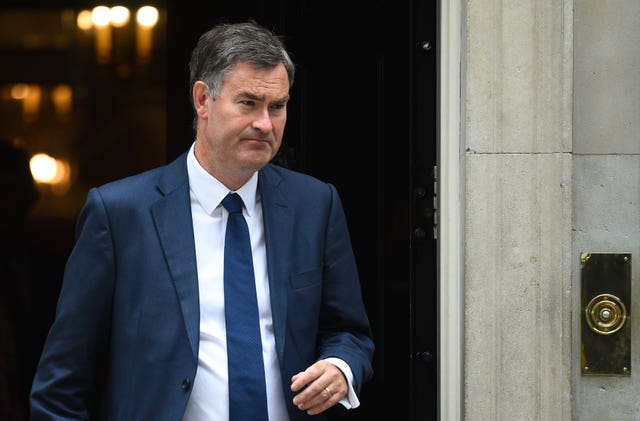Starmer ‘shares public’s anger’ as prisoners pictured leaving prison early
Around 1,100 inmates are expected to be freed in a second wave of early releases under the Government’s policy to free up prison space.

The Prime Minister “shares the public’s anger” at images of prisoners being released early, including one who said “big up Keir Starmer”.
Around 1,100 inmates are due to be freed in a second wave of early releases under the Government’s policy to free up prison space.
Inmate Daniel Dowling-Brooks said “big up Keir Starmer” as he celebrated his release with his friends, mother and sister, who picked him up in a convoy of a white Bentley and black Mercedes G-Wagon outside HMP Swaleside in Kent.
The 29-year-old told reporters he had been in prison for seven years for kidnap and grievous bodily harm of someone who owed money to his friend, and was leaving jail seven weeks earlier than planned.
He said the first thing he would do is “go to McDonald’s, go to my hostel and follow all the rules”.

A number of men could be seen walking down the road with bin bags slung over their shoulders, one also shaking hands with a security guard, leaving the prison estates on the Isle of Sheppey, which is home to HMP Swaleside, HMP Standford Hill and HMP Elmley.
At HMP Manchester, known locally as Strangeways, around a dozen prisoners emerged from behind the giant steel doors of the Victorian-era prison.
None wanted to speak directly to media and many wore face masks or covered their faces with white release papers as they quickly headed for waiting family and friends.
One man would only say he had been released nine months early from his sentence of seven and a half years thanks to the new scheme.
It was not clear whether others were being released early or after serving their time.
“But just to be clear, there was no choice not to act. If we had not acted, we would have faced a complete paralysis of the system.”
He said this marks the “second and final” release of prisoners under the Government’s scheme.
Asked if there could be another scheme for future early releases, he said the focus would move to reforms to sentencing and building prisons to create more spaces.
The Government plans to increase the maximum period eligible offenders can spend under house arrest from six months to 12 months, Justice Secretary Shabana Mahmood told MPs in the House of Commons.
She also said she would also address the soaring number of recalls – the return to prison of those released on licence or parole who break probation rules.
“Later this month, I intend to review the risk-assessed recall review process so that lower risk cases can be considered for re-release after they have been recalled to prison for two to three months, where their further detention is no longer necessary to protect the public.”
The Government will also “accelerate” the deportation of foreign nationals, as opposed to imprisoning them in the UK, she said.
Ms Mahmood has launched a review into sentencing that will look at handing out more punishments to offenders outside prison.
The review aims to explore tougher punishments outside prison while making sure there is space to incarcerate the most dangerous offenders.

“People still have to know that you are being punished for breaking the laws of our land, even if you’re not serving time in custody.
“There are real consequences, that you really feel the loss of your liberty still.”
Tags are already being used to supervise and monitor offenders serving sentences outside prison but the review will consider bringing in emerging technologies used in other countries, she said.
Asked if she was taking a new approach and wanted fewer people incarcerated in Britain, she said that the rate of increase is such that “nobody can keep up with demand”.
The prison population is increasing by 4,500 every year and the Government has committed to creating 14,000 additional prison spaces.
David Gauke, the former justice secretary who has argued that there is a strong case for abolishing most jail terms of six months or under, will chair the review panel.
He wrote that the “capacity crisis in our prisons has meant that, at the very least, we have no choice but to pause the increase in the prison population”, in an article in the New Statesman on Tuesday.
As part of the review, the Government will looking to foreign jurisdictions for ideas, such as in Texas where authorities have used good behaviour credits.
Punishments outside prison could involve using wristwatches or apps that “nudge” offenders to ask if they have complied with licence conditions, in addition to sobriety tags or home detention curfews.

The review will also consider whether more can be done to tackle prolific offending and crimes committed against women and girls by drawing up sentences that reflect the severity of the act.
Ms Mahmood announced plans in July to temporarily reduce how much of their sentences inmates must serve behind bars from 50% to 40% as the Ministry of Justice said overcrowding had pushed jails to the “point of collapse”.
The first release of around 1,700 prisoners from jails across England and Wales started on September 10. The latest tranche has expanded eligibility to include those serving sentences of five years or more.
Ms Mahmood said mistakes that previously led to the release in error of 37 prisoners as part of the scheme have been “ironed out”.
“That issue has been sorted and it has been resolved, and for the releases that are taking place today, that is not a mistake that will occur again,” she told Times Radio.
The rates of recall in the cohort of early releases are “broadly in line” with usual prison releases, she told LBC after a probation officers’ union said a “significant number” had been recalled to custody.

The number of prison spaces fluctuates but it is understood there are currently about 89,000 in total.
The findings of the sentencing review will be submitted by spring of next year. The results of the review are expected to take effect by March 2026 at the earliest.
The Prison Reform Trust said the average prison sentence for serious, indictable offences is now 62.4 months — almost two years longer than in 2010.
The cost of punishment outside prison is estimated at around £5,000 annually per person compared with more than £50,000 to imprison someone for a year.





